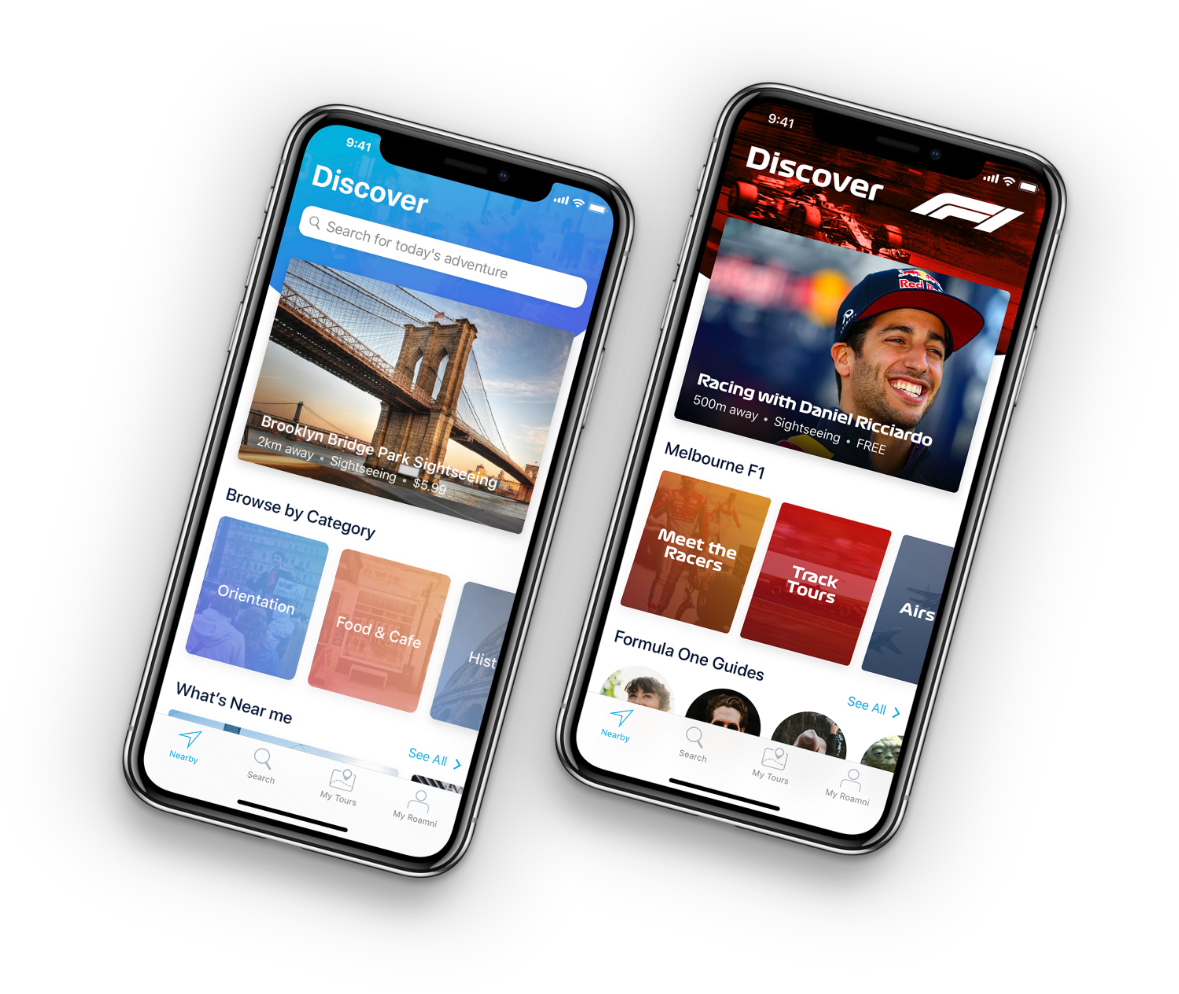What Does a Backend Developer Do and How To Become One

An app or website is very much like a car. And the back-end developer is its engine builder and mechanic.
The backend is where the action is, despite being mostly unseen. It’s the section of a web app or website that enables it to work the way you want it to. The backend is the opposite of the front end, which includes things you can see, like links, borders, icons, buttons, etc.
Given the crucial role of a system’s backend, it’s no surprise that U.S.-based backend developers earn around $11,000 per month for their time and expertise.
If you’re interested in this exciting career, read the article to learn more about what a typical backend developer does, what skills and character traits they must possess, and how you can acquire the skillset and characteristics to thrive in this field.
But first, what exactly is a backend developer?
What is a backend developer?
A backend developer is a programmer who specializes in building and maintaining the server-side aspects of a digital product, such as a web application or website. While frontend developers focus on the user interface and visual elements that users interact with, backend developers work behind the scenes to ensure everything runs smoothly and efficiently.
Specifically, backend developers write and maintain the code that powers servers, manages databases, and handles the logic and operations that drive the functionality of digital products. In essence, backend developers ensure that websites and web apps work seamlessly, enabling users to have a smooth and reliable experience.
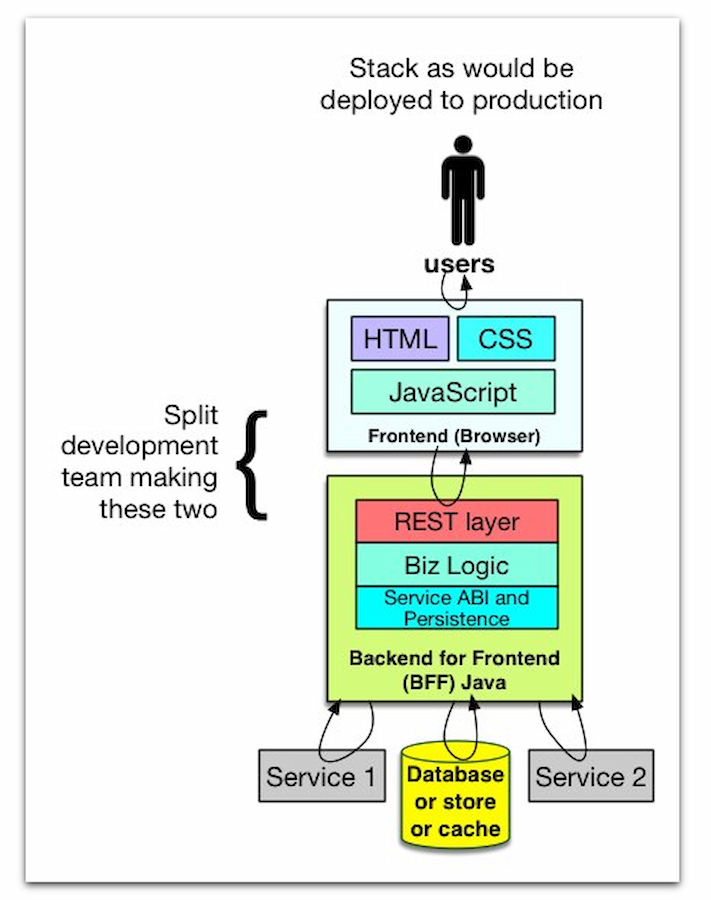
Source: Paul Hammant’s Blog
Despite their differences in expertise, back-end developers work with front-end developers, designers, and other team members to ensure the entire digital product functions seamlessly and meets user needs in terms of appearance and functionality.
Though some people think back-end developers are the same as backend engineers, they are slightly different. While back-end developers focus on specific parts of the digital product, such as coding and program functionality, back-end engineers take on a broader role. The latter strategizes and oversees the overall system architecture to guide the work of back-end developers.
What does a back-end developer do?
A back-end developer is essential for building and maintaining the server-side infrastructure of web applications or websites. A server is mainly the processing and storage system on which a digital product depends to function or perform tasks. In short, websites or web apps won’t work without a server.
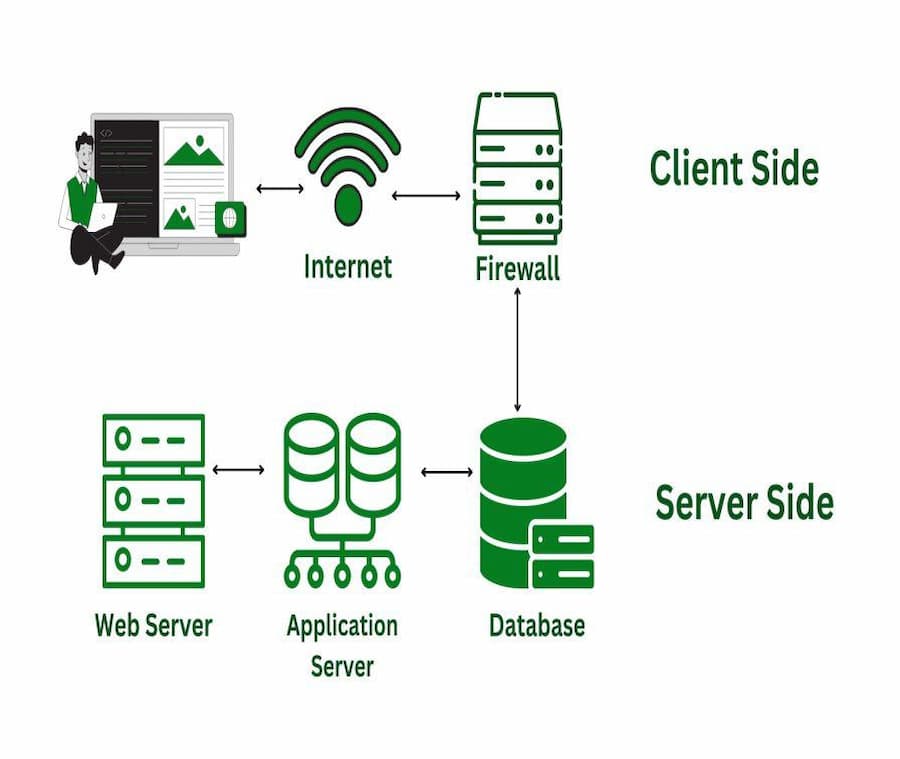
Source: Geeks for Geeks
To keep web-based digital products functional, back-end developers have to be competent in dealing with the technical and human side of back-end development:
The technical side of backend development
Back-end development mainly involves ensuring that a web app or website functions as effectively and efficiently as possible. Therefore, a backend developer must do the following to make a digital product perform at its best.
- Server-side development. A backend developer takes charge of server-side development by writing code that enables servers to manage data and handle front-end requests. To do this, they use programming languages like Python, Java, Ruby, PHP, or Node.js. A developer specializing in back-end components also uses frameworks such as Django, Spring Boot, Ruby on Rails, Laravel, or Express.js to perform this job.
- Database management. This task involves designing and maintaining storehouses of electronic information called databases. A backend developer ensures the integrity and security of the information stored in databases.
- API development. Application programming interfaces (APIs) enable communication between the different components of a digital product and external systems. An expert in back-end development considers scalability and security when developing APIs.
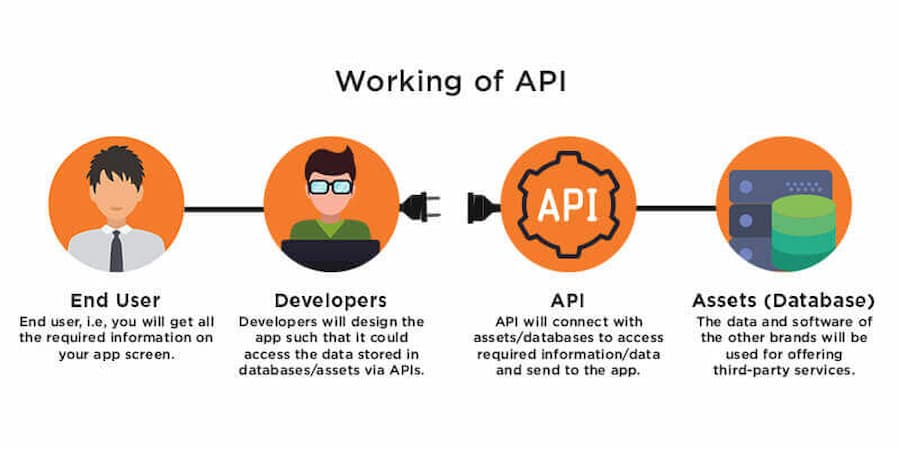
Source: freeCodeCamp
- Integration of third-party services. Sometimes, web apps and websites depend on external services for most of their functionality. A backend developer incorporates features such as payment gateways, authentication services, or cloud storage into the digital product to maximize user satisfaction and safety.
- Performance optimization. A backend developer ensures a digital product’s speed and efficiency by ensuring correct server settings, checking underlying code for defects, etc.
- Security. The Internet is full of cybersecurity threats. A backend developer ensures that a digital product has measures like authentication and data encryption to ensure the safety of user information and the integrity of the site’s or app’s underlying code.
- Testing and debugging. An expert in backend development conducts tests to ensure code reliability and stability. They also identify and address web development, testing, or production issues.
- Documentation. Updating and maintaining web apps or websites require a sort of historical record for the reference of the development team. Like any developer, a back-end developer maintains comprehensive documentation for the codebase, including comments, API documentation, and technical guides. Maintaining these documents ensures the whole team is on the same page whenever updates are implemented. For easier management, you can convert PDF files of the documentation into editable formats.
The human side of backend development
A single backend web developer cannot build a good app or website by themselves, especially if the digital product in question impacts many people’s lives or affects the operations of important organizations. That’s why a back-end developer must be able to work with other people in doing the following:
- Requirement or need clarification. This task involves working with front-end developers, clients, designers, project managers, and product managers to understand requirements and clearly define the desired technical solutions.
- Training and support. A backend developer must be able to collaborate with client teams to provide ongoing support. A more senior backend expert must also be willing and able to mentor junior developers.
Ultimately, backend development’s human and technical aspects must work together for the best possible results. You can find that synergy at Appetiser Apps. Discover how we synthesize both human and technical resources in creating apps and websites by booking a free consultation with us.
As you can see, what a backend developer does goes way beyond hardware and coding. You will see in the next section that the ideal back-end developer needs more than just technical skills to thrive in this field.
What are the skills required for a backend developer?
A backend developer needs technical and soft skills to leverage physical and human resources to create high-quality websites or web apps.
Technical skills required of a backend developer
A backend developer’s technical skills are crucial for building and maintaining the nuts and bolts of web applications and websites. Through these competencies, a backend expert ensures that the app or website they are developing is reliable and performs tasks quickly and effectively.
To ensure the components of a digital product work seamlessly with each other, a good backend developer needs to have above-average skills in the following technical areas:
- Programming languages. Proficiency in backend languages such as Python, Java, and PHP is essential. Python is particularly popular for its compatibility with AI and machine learning, enabling clear and logical code writing. Basic knowledge of front-end languages like HTML, CSS, and JavaScript is also beneficial because these three languages are among the most commonly used ones in the industry.
- Frameworks. A backend developer must be familiar with frameworks like Flask and Django for Python, as these libraries help build server configurations efficiently.
- Databases and servers. A crucial skill for a backend expert is understanding how to manage and retrieve data from databases such as MongoDB and MySQL. They can also implement a CDC solution to monitor and capture real-time data changes across these database systems. On top of that, they optimize database performance by doing things like controlling access to information stored in databases to ensure data organization and retrievability.
- Application Program Interface (API). Knowledge of APIs is vital as they define rules for developing application software. This includes building applications for web browsers and mobile platforms using languages like JavaScript.
- Accessibility and security. Proficiency in network protocols and web security is necessary to secure databases and servers, which is crucial for a backend developer’s success.
Soft skills required of a backend developer
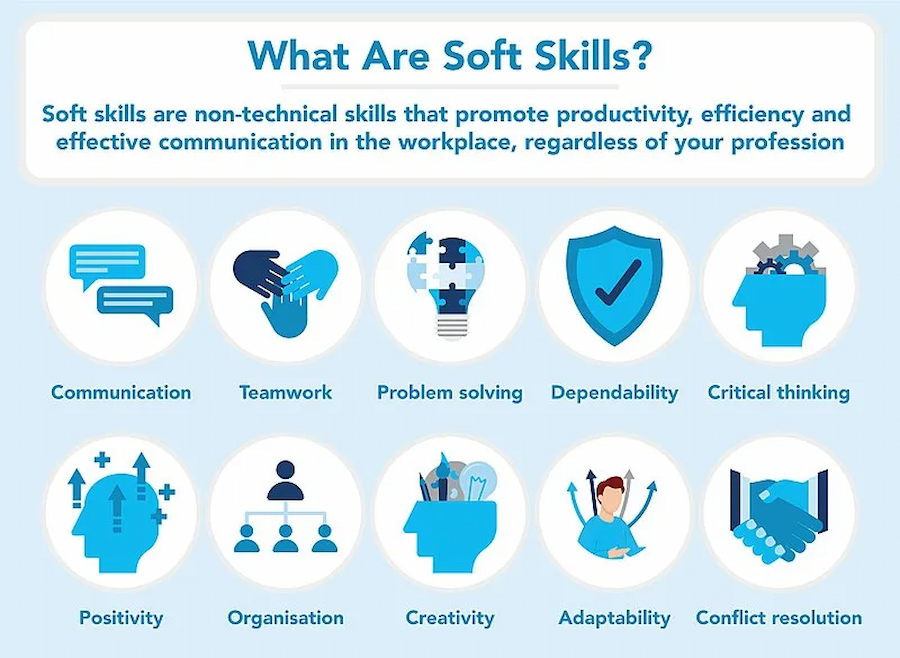
Source: LinkedIn
What a backend developer does with his technical abilities is just half the story. Aside from technical competence, a backend developer also needs strong soft skills, which are mostly personality traits and the ability to effectively deal with other people. This is why those with an enneagram personality type 5 often thrive in this role, as they are naturally curious, detail-oriented, and able to think critically under pressure.
In a world with millions of apps and billions of websites, developing competitive web-based digital products that stand out is becoming increasingly difficult to do solo. That’s why a backend developer needs the help of a team of designers and developers to produce the best possible web app or website.
The following skills are crucial for a backend developer to work efficiently and effectively within a team environment:
Get the latest industry news first.
- Communication. Effective communication skills are essential for a backend developer so they can understand and execute the client’s vision. A good skillset includes both written and verbal communication to convey ideas more effectively and troubleshoot with colleagues and stakeholders more seamlessly.
- Problem-solving and analytical thinking. An expert in backend development must be adept at finding creative solutions when building web apps or websites. This involves quickly debugging the right code section, revising it without crashing the digital product, and analyzing the code’s functionality to prevent errors.
- Thirst for fresh knowledge about the industry. Passion about the latest trends and updates in the tech industry is important. What a backend developer does is much more enriched by their regular engagement with blogs, forums, news, and books related to business and technology. With updated and diverse knowledge, a backend developer maintains a holistic understanding of the field, giving them confidence when dealing with clients, investors, and team members.
How to become a back-end developer?
There are many ways to become a backend developer besides getting a bachelor’s degree in computer science or information technology (though I will discuss how you can attain this qualification without spending too much, if you’re interested).
The following are some learning pathways you can consider, which vary depending on your learning style, budget, time availability, and career goals.
Self-study
Self-study is an independent and flexible route if you are highly disciplined and motivated.
Through this learning method, you access on your own online resources like tutorials, documentation, and coding challenges to learn programming languages, frameworks, and backend development concepts. The flexibility allows you to learn at your own pace and focus on specific skills relevant to your interests, making it cost-effective.
Platforms like Coursera, edX, and Udemy offer relevant self-study courses. However, even if some of these platforms award certificates at the end of the courses, these certifications don’t usually have the same weight in the industry as those provided by other learning pathways, which I will discuss next.
Industry certifications
Earning industry certifications is another way to help you transition into a career in backend development.
Organizations that award certificates are not learning institutions. They let you take an exam and give you the certificate once you pass. Therefore, industry certifications work best with self-study if you want a relatively quick and inexpensive path to becoming a bona fide backend developer.
Notable certifications include those offered by major tech companies like Microsoft, Amazon, and Google. Given the industry reputation of these organizations, certifications help you stand out in the job market.
However, certifications often focus on specific technologies rather than a broad understanding of backend development principles. They may also require periodic renewal.
Coding bootcamps
Coding bootcamps offer an intensive and structured learning experience designed to equip you with essential backend development skills in a short timeframe, often just weeks or months.
These programs mix lectures, coding exercises, and real-world projects to ensure you gain practical skills and are job-ready upon course completion. In fact, bootcamps like Springboard, The Flatiron School, and Hack Reactor often include career services to help secure employment.
Many coding bootcamps also don’t require you to have any prior knowledge and experience regarding programming or engineering. However, some might test your verbal skills and logic before letting you enroll.
Though boot camps are not cheap, they tend to be less expensive than vocational schools or colleges, mainly because of the relatively brief study period.
Though the fast-paced nature of bootcamps might be challenging for some, they are generally an effective way to quickly transition into a backend development role.
Vocational schools
Vocational schools provide career-oriented training programs in backend development, ranging from a few months for certificate programs to two years for associate degrees.
These programs offer hands-on training and focus on practical skills and technologies used in the industry, making them a cost-effective and efficient way to become job-ready quickly. While vocational programs might not provide as comprehensive a foundation in computer science fundamentals as a four-year degree, they are well-suited for those looking to enter the workforce rapidly.
Vocational schools also tend to be less expensive than institutions that award bachelor’s degrees. In America, the cost of vocational is only around 10% to 50% of the total cost of the average college or university program.
Suppose your country’s educational system mirrors that of the U.S.. In that case, you might consider studying backend development at a vocational school and then using the credits you earned there to pursue a computer science or information technology degree in university. Many educational and vocational institutions in America practice this kind of credit transfer.
Ultimately, you can explore the vocational-to-college route if you want the massive benefits of a college-level computer education while keeping tuition costs low and ensuring you get a job the soonest.
College or university
Pursuing a computer science degree from a college or university provides a well-rounded education in computer science fundamentals, including algorithms and backend development. Therefore, this pathway offers doors to a broader range of career opportunities in software development.
Universities like MIT, Stanford, Carnegie Mellon, UC Berkeley, and the University of Washington are renowned for their computer science programs.
While a college degree requires a significant time and financial investment and may not always focus on the latest industry technologies, it equips you with critical thinking skills and a deep understanding of the field, positively impacting your long-term career growth.
Get in front through robust back-end development
As you can see, back-end developers play an important role in the functioning of web apps and websites.
You’ve also learned that to become a good backend developer, you need the right personality traits, competence in interpersonal relations, and technical skills. Whatever you lack in any of these areas, you can pursue them through various learning pathways that accommodate a variety of time and cost constraints.
Delving into back-end development is potentially beneficial if you want to upgrade your career skillset or develop life-enriching character traits.
But if you’re studying back-end development to create a financially sustainable web app or website, then outsourcing your project needs to an app development agency might be a better option. Whatever your level of technical competence, outsourcing unlocks time and cost savings that few other app development methods can.
To discover another way to reach the front end of the digital industry, book a free consultation with us. Our friendly and competent experts are willing to help you explore ways to achieve your goals through top-notch digital products.

Jesus Carmelo Arguelles, aka Mel, is a Content Marketing Specialist by profession. Though he holds a bachelor’s degree in business administration, he also took courses in fields like computer troubleshooting and data analytics. He also has a wealth of experience in content writing, marketing, education, and customer support.
Get the latest industry news first.


